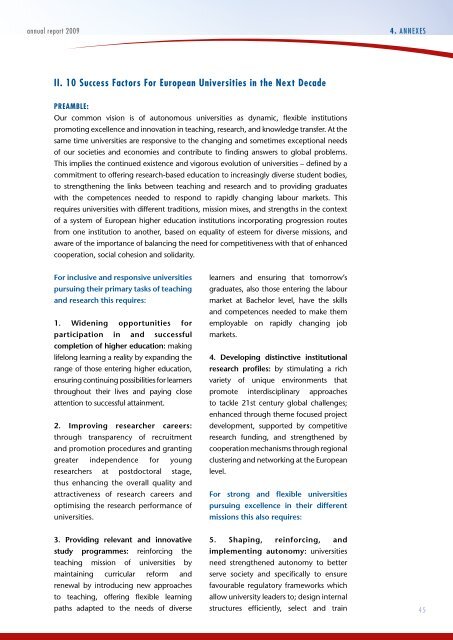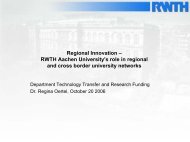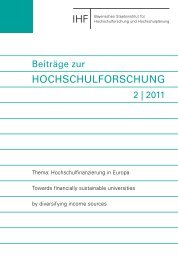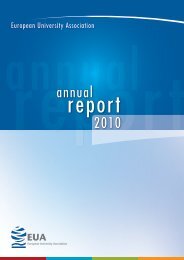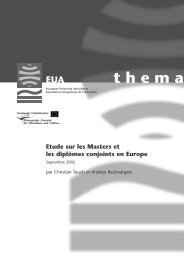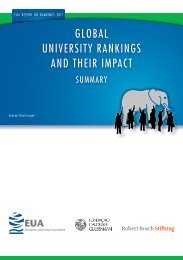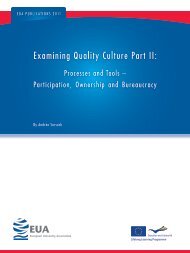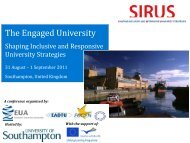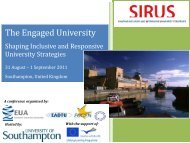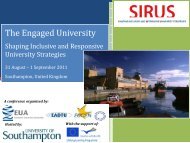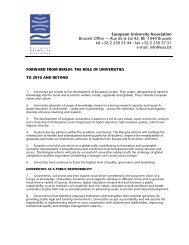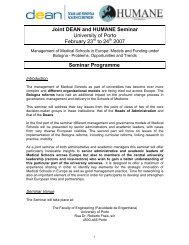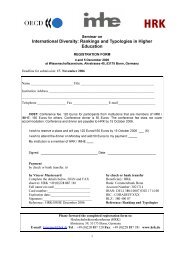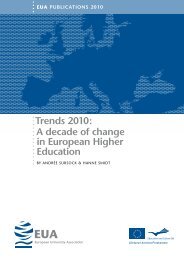English - European University Association
English - European University Association
English - European University Association
You also want an ePaper? Increase the reach of your titles
YUMPU automatically turns print PDFs into web optimized ePapers that Google loves.
annual report 2009 4. ANNEXES<br />
II. 10 Success Factors For <strong>European</strong> Universities in the Next Decade<br />
PREAMBLE:<br />
Our common vision is of autonomous universities as dynamic, fl exible institutions<br />
promoting excellence and innovation in teaching, research, and knowledge transfer. At the<br />
same time universities are responsive to the changing and sometimes exceptional needs<br />
of our societies and economies and contribute to fi nding answers to global problems.<br />
This implies the continued existence and vigorous evolution of universities – defi ned by a<br />
commitment to offering research-based education to increasingly diverse student bodies,<br />
to strengthening the links between teaching and research and to providing graduates<br />
with the competences needed to respond to rapidly changing labour markets. This<br />
requires universities with different traditions, mission mixes, and strengths in the context<br />
of a system of <strong>European</strong> higher education institutions incorporating progression routes<br />
from one institution to another, based on equality of esteem for diverse missions, and<br />
aware of the importance of balancing the need for competitiveness with that of enhanced<br />
cooperation, social cohesion and solidarity.<br />
For inclusive and responsive universities<br />
pursuing their primary tasks of teaching<br />
and research this requires:<br />
1. Widening opportunities for<br />
participation in and successful<br />
completion of higher education: making<br />
lifelong learning a reality by expanding the<br />
range of those entering higher education,<br />
ensuring continuing possibilities for learners<br />
throughout their lives and paying close<br />
attention to successful attainment.<br />
2. Improving researcher careers:<br />
through transparency of recruitment<br />
and promotion procedures and granting<br />
greater independence for young<br />
researchers at postdoctoral stage,<br />
thus enhancing the overall quality and<br />
attractiveness of research careers and<br />
optimising the research performance of<br />
universities.<br />
3. Providing relevant and innovative<br />
study programmes: reinforcing the<br />
teaching mission of universities by<br />
maintaining curricular reform and<br />
renewal by introducing new approaches<br />
to teaching, offering fl exible learning<br />
paths adapted to the needs of diverse<br />
learners and ensuring that tomorrow’s<br />
graduates, also those entering the labour<br />
market at Bachelor level, have the skills<br />
and competences needed to make them<br />
employable on rapidly changing job<br />
markets.<br />
4. Developing distinctive institutional<br />
research profi les: by stimulating a rich<br />
variety of unique environments that<br />
promote interdisciplinary approaches<br />
to tackle 21st century global challenges;<br />
enhanced through theme focused project<br />
development, supported by competitive<br />
research funding, and strengthened by<br />
cooperation mechanisms through regional<br />
clustering and networking at the <strong>European</strong><br />
level.<br />
For strong and fl exible universities<br />
pursuing excellence in their different<br />
missions this also requires:<br />
5. Shaping, reinforcing, and<br />
implementing autonomy: universities<br />
need strengthened autonomy to better<br />
serve society and specifi cally to ensure<br />
favourable regulatory frameworks which<br />
allow university leaders to; design internal<br />
structures effi ciently, select and train<br />
45


